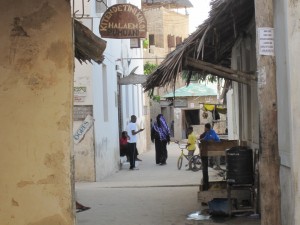Lamu Island, Kenya March 20th 2011
 A man can come to escape from many things on Lamu Island—the sea breezes and relaxed Swahili culture of this timeless town and its endless sand beaches are a feast for the eye and balm to the soul for all and anything that ails you. After malaria and malarial reoccurrence—make the previous night of sweats and chills the last, please—and, perhaps, enough excitement from the wearing and wondersome DRC, Lamu is just what the doctor ordered.
A man can come to escape from many things on Lamu Island—the sea breezes and relaxed Swahili culture of this timeless town and its endless sand beaches are a feast for the eye and balm to the soul for all and anything that ails you. After malaria and malarial reoccurrence—make the previous night of sweats and chills the last, please—and, perhaps, enough excitement from the wearing and wondersome DRC, Lamu is just what the doctor ordered.
Upside—there are no cars on this island, only donkeys navigating the narrow alleyways. Downside—braying donkeys and (much) donkey pooh. Like any tourist town there are touts punting dhow rides and offering city tours. But a polite no is more than enough to ward off anything unwanted; there is little aggravation or aggression in Lamu. Locals even refer to mainland Kenya, with its corruption and crime as some far off place. Those problems can certainly feel far away here.
All tastes are catered for on Lamu. There are $10/night backpackers hostels and €1000/night luxury homes and boutique hotels. The Euro-trash international jet set have found a place here—you can even rent Princess Stephanie of Monaco’s private home (when she is not here).
There are other refugees seeking respite here—people fleeing professional, financial and personal turmoil and whom you see in the local bars or running small businesses. Somerset Maugham and Graham Greene would feel comfortable among these broken and wounded souls, people you can find from Thailand to Timbuktu. Others are a more particular and local kind of African refugee—the continent’s white people, a group, both toughened and sophisticated, who have been everywhere, seen it all, experienced warfare and upheaval in other countries, and always looking for one last, more stable, place to move on to. You will find such people in South Africa—ex Portuguese settlers from Mozambique and Angola, even some aged French Pied Noirs from Algeria. And you will find them here in—relatively— stable and prosperous Kenya.
The Lamu House Hotel has probably the best restaurant in Lamu old town and its terrace over looking the harbour with tasteful local furniture, small bar, and good kitchen and wine list is where anyone can find small but very pleasant comforts. The Belgian propetier is a large man in his late 50s with an Ernest Hemingway beard and a competent and firm, but not too firm, hand with his employees. Like the restauranteur in Peter Greenaway’s The Cook, the Thief, his Wife and her Lover—someone loosely based on the infamous owner of Langan’s Brasserie in London—this is a larger than life character, someone who has probably experienced the sharper side of things, is not uncomfortable with them either. I imagine this man as a hedonist and an adventurer, someone out of place, a misfit, in Europe, but who has found an outlet for his 19th century style passions and pursuits in Africa. I feel like I’ve found a kindred spirit. But he is a good host and solicitous as ever as he passes from table to table to get to know his guests.
You just came from DRC? Yes, I know it well—my best years there. I had to leave when the war started and Mobutu was overthrown in 1996—I lost all my businesses and it was too late to try to start over again with a new crew. Kabila? Much the same as Mobutu I guess, Mobutu was just a bit more stylish and opulent about it, about the theft and corruption. I don’t expect much and I’m never disappointed, they are all the same really. I’ve been running this place ever since—it’s a pleasant spot. And Kenya?—it’s a good spot, also, yes, but it could all go up in smoke, just like everywhere else.
Hope for the best and expect the worst. To do business in this continent you have to have already made all your money and be prepared to lose it all. And one thing: always have a fall back plan.
